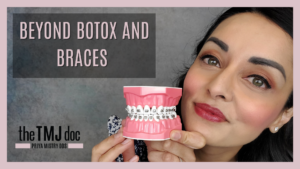TMJ & Headaches
Nothing disrupts daily life quite like a headache! It may impede your ability to perform at work or school, complete household tasks, and enjoy your favorite activities.
Do you experience any of the following?
- Occipital Headaches
- Tension Headaches
- Migraines
- Pain or Pressure in the Head
- Pain Behind the Eyes
If you deal with the symptoms listed above, then your headaches could be caused by Temporomandibular Joint Disorder (also known as TMJ/TMD).
Evaluating the link between TMJ/TMD and headaches can be complex! Many patients benefit from a face-to-face consultation with a TMJ Practitioner to better grasp these concepts. If you or someone you love lives with frequent, painful headaches and you suspect that TMJ Disorder could be the cause, consider scheduling an evaluation with Dr. Priya Mistry.
How TMJ/TMD Could Be Responsible For Your Headaches or Migraines
TMJ Disorder negatively impacts the joints, musculature, nerves, and blood vessels of the jaw and head. One nerve that is often affected by temporomandibular joint disorder is the trigeminal nerve, a major neural pathway in the body. All headaches – every single one – are mediated through the trigeminal nerve and are caused by overstimulation of this nerve.
With TMJ/TMD, the muscles of the head and jaw are often edematous and swollen and they put pressure on the trigeminal nerve. When this happens, the nerve transmits pain signals to the outer covering of the brain – causing headaches. These headaches can be recurrent and severe enough to be classified as migraines or vestibular migraines. TMJ/TMD can also cause tension headaches, hemicrania continua, cluster headaches, and more! Effectively treating TMJ/TMD leads to a significant decrease in severity and frequency of all types of headaches.
If you experience headaches that could be caused by Temporomandibular Joint Disorder, even the most powerful prescription medications or other migraine therapies will not provide lasting relief. The best way to substantially decrease or stop these headaches is to find a skilled and experienced TMJ practitioner who offers effective TMJ/TMD treatment!
Medication-Free Treatment for TMJ-Related Headaches
As a TMJ Dentist who has dedicated her practice to taking care of those with TMJ pain and dysfunction, Dr. Priya Mistry will conduct a thorough examination to identify if TMJ Disorder is present and then treat the issue by resolving the dysfunction of the temporomandibular joint as well as the muscles that surround and support the jaw with TMJ orthotics, craniofacial therapy, and frequent orthotic adjustments OR T-Scan & DTR treatment if appropriate. Dr. Mistry is a top-rated TMJ Dentist Vancouver, WA. She offers TMJ/TMD treatment with a non-surgical and medication-free approach.
Find out more about the importance of choosing the right TMJ dentist here!
How to Tell if You Have TMJ/TMD
Common symptoms of TMJ include a limited range of motion of the jaw, jaw pain, headaches, ear pain, facial pain, or hearing a clicking or popping sound as your jaws open and close.
Feel free to visit our page regarding Frequently Asked Questions About TMJ Disorder for more information. To schedule a consultation, please contact Dr. Mistry at The TMJ Doc by calling (503) 255-8293.







